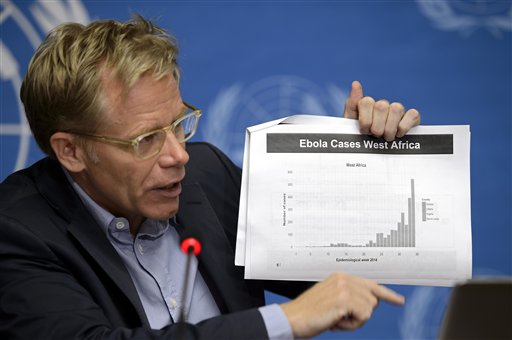GENEVA (AP) — The Ebola outbreak in West Africa is accelerating and could grow six times larger to infect as many as 20,000 people, the World Health Organization said Thursday. The U.N. health agency unveiled a new road map for containing the virus, and scientists are fast-tracking efforts to find a treatment or vaccine.
Ebola has menaced Africa for 40 years, but previously struck in remote villages and was contained fairly quickly. This time, it has spread to major cities in four countries, provoking unrest as whole neighborhoods and towns have been sealed to the outside.
An experimental vaccine developed by the U.S. government and GlaxoSmithKline will be tested on humans starting next week, the U.S. National Institutes of Health announced Thursday. The NIH trial will use healthy adult volunteers in Maryland, and British experts will simultaneously test the same vaccine in healthy people in the U.K., Gambia and Mali.
Preliminary results on the vaccine’s safety — not its effectiveness — could be available in months.
Scientists also announced that they have mapped the genetic code of this strain of Ebola to better understand how it kills. In a study published Thursday in the journal Science, researchers traced an explosion of cases in this outbreak to a single funeral in Guinea in May.
They hope to use the genetic mapping to track mutations that could become more worrisome the longer the outbreak lasts, and make a difference in how doctors spot and fight the disease as vaccines are developed.
The outbreak has now killed at least 1,552 people among 3,069 reported cases in Liberia, Sierra Leone, Guinea and Nigeria, and the real caseload in urban areas could be two to four times higher. Meanwhile, an entirely separate Ebola outbreak has killed 13 of 42 people sickened in a remote area of Congo, in Central Africa, the agency said.
With about a 50 percent mortality rate among those known to be infected, the overall death toll could reach 10,000 in the worst-case scenario.
“I think that’s completely unacceptable,” said the agency’s emergency operations director, Dr. Bruce Aylward.
The WHO’s new plan would cost $489 million to support 750 international health workers and 12,000 national ones. It aims to:
— stop Ebola transmission in affected countries within six to nine months
— prevent the spread of any new infections within eight weeks of a case being identified anywhere in the world
— and improve the public health responses to Ebola in any nation with major transportation hubs or borders shared with affected countries.
With the world’s support, medical workers hope to take “the heat out of this outbreak” within three months, Aylward said.
The U.N. agency’s announcement was immediately criticized by Doctors Without Borders, a medical charity running many of the treatment centers in West Africa.
“The WHO road map is welcome, but it should not give a false sense of hope. A plan needs to be acted upon. Huge questions remain,” the charity’s operations director, Bruce de le Vingne, said in a statement. “States with the capacity to help have the responsibility to mobilize resources to the affected countries, rather than watching from the sidelines with a naive hope that the situation will improve.”
Containment is key, but it has to be done carefully, in ways that don’t cause panic or hamper the response, the agency said.
The WHO has supported the quarantine of sick people, and said cordoning off entire neighborhoods can be useful, as long as civil rights are respected. But it has called on airlines to resume flights to affected countries, since Ebola is unlikely to spread through air travel. Health checks at airports should provide sufficient protection while still enabling humanitarian workers to get in.
“Right now there is a super risk of the response effort being choked off, being restricted, because we simply cannot get enough seats on enough airplanes to get people in and out, and rotating, to get goods and supplies in and out and rotating,” Aylward said.
Ebola and the measures used to control it are making it harder for some of the world’s poorest people to feed themselves and seek medical care. Many thousands of people have been cut off from markets; food prices have soared and farmers are separated from their fields. People now fearing hospitals are going without treatment for other diseases, like malaria, which kills around 600,000 each year, 90 percent of them in Africa.
The World Food Program says it needs $70 million immediately to help feed 1.3 million people in Guinea, Liberia and Sierra Leone in the coming months because control measures have threatened food supplies.
Nigerian authorities, meanwhile, confirmed their first fatality outside the commercial capital of Lagos, where a dying Liberian-American airline passenger infected others in late July. They said a man sickened after coming into contact with the passenger had evaded surveillance and infected a doctor in southern Nigeria, who later died.
—
Larson reported from Dakar, Senegal. Seth Borenstein in Washington; Bashir Adigun in Abuja, Nigeria; Sarah DiLorenzo in Dakar; and Maria Cheng in London contributed to this report.

COMMENTS
Please let us know if you're having issues with commenting.